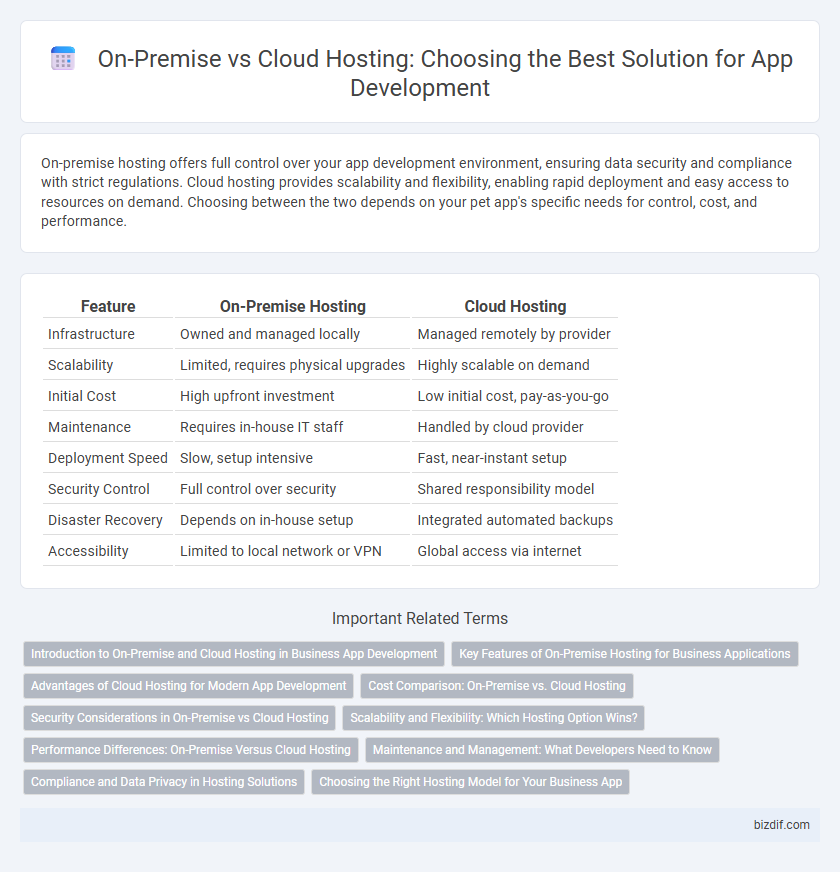On-premise hosting offers full control over your app development environment, ensuring data security and compliance with strict regulations. Cloud hosting provides scalability and flexibility, enabling rapid deployment and easy access to resources on demand. Choosing between the two depends on your pet app's specific needs for control, cost, and performance.
Table of Comparison
| Feature | On-Premise Hosting | Cloud Hosting |
|---|---|---|
| Infrastructure | Owned and managed locally | Managed remotely by provider |
| Scalability | Limited, requires physical upgrades | Highly scalable on demand |
| Initial Cost | High upfront investment | Low initial cost, pay-as-you-go |
| Maintenance | Requires in-house IT staff | Handled by cloud provider |
| Deployment Speed | Slow, setup intensive | Fast, near-instant setup |
| Security Control | Full control over security | Shared responsibility model |
| Disaster Recovery | Depends on in-house setup | Integrated automated backups |
| Accessibility | Limited to local network or VPN | Global access via internet |
Introduction to On-Premise and Cloud Hosting in Business App Development
On-premise hosting involves deploying business applications on local servers within a company's infrastructure, offering complete control over data security and customization. Cloud hosting leverages remote servers managed by third-party providers, enabling scalable resources and reduced upfront costs for app development. Choosing between on-premise and cloud hosting impacts performance, maintenance, and compliance in business app environments.
Key Features of On-Premise Hosting for Business Applications
On-premise hosting offers businesses complete control over their application environment, enabling customization tailored to specific organizational needs and stringent security measures. It provides direct access to hardware resources, resulting in consistent performance and reduced latency for critical business applications. Data sovereignty remains a key advantage, as sensitive information is stored on-site, aligning with compliance requirements and internal governance policies.
Advantages of Cloud Hosting for Modern App Development
Cloud hosting offers scalable infrastructure that adapts to fluctuating app demands, ensuring optimal performance without upfront hardware investments. It provides seamless integration with modern development tools like CI/CD pipelines and container orchestration platforms such as Kubernetes, accelerating deployment cycles. Robust security measures, automatic updates, and global distribution capabilities enhance app reliability and data protection for enterprises embracing digital transformation.
Cost Comparison: On-Premise vs. Cloud Hosting
On-premise hosting requires significant upfront investment in hardware, software licenses, and IT personnel, leading to higher initial costs but more predictable long-term expenses. Cloud hosting operates on a pay-as-you-go model, offering lower initial costs with scalability but potential variable monthly fees based on usage and data transfer. Evaluating total cost of ownership involves factoring in maintenance, upgrades, downtime risk, and scalability needs for accurate comparison between on-premise and cloud hosting.
Security Considerations in On-Premise vs Cloud Hosting
On-premise hosting offers direct control over security protocols, data access, and physical hardware, enabling organizations to tailor defense measures to specific compliance requirements. Cloud hosting providers implement advanced multi-layered security frameworks, including encryption, intrusion detection, and continuous monitoring, but entrust critical data to third-party infrastructure. Evaluating the trade-offs between on-premise customization and cloud provider safeguards is essential for app developers prioritizing data confidentiality and regulatory adherence.
Scalability and Flexibility: Which Hosting Option Wins?
On-premise hosting offers limited scalability and flexibility due to physical hardware constraints, making it challenging to quickly adapt to fluctuating app development demands. Cloud hosting excels with virtually unlimited scalability and dynamic resource allocation, enabling seamless adjustments to traffic spikes and project requirements. Choosing cloud hosting ensures superior flexibility for evolving app development environments, optimizing performance and cost-efficiency.
Performance Differences: On-Premise Versus Cloud Hosting
On-premise hosting provides direct control over hardware and network resources, often resulting in lower latency and faster data processing for app development environments. Cloud hosting offers scalable infrastructure with high availability, but performance can vary depending on internet connection quality and shared server loads. Developers must weigh the benefits of consistent, predictable performance in on-premise setups against the flexibility and global reach provided by cloud hosting solutions.
Maintenance and Management: What Developers Need to Know
On-premise hosting requires developers to manage hardware maintenance, software updates, and security patches, often demanding specialized IT staff and increased operational resources. Cloud hosting shifts maintenance responsibilities to the service provider, enabling developers to focus on application deployment and scalability without worrying about underlying infrastructure. Effective management in cloud environments includes configuring automated updates, monitoring performance through dashboards, and leveraging provider-managed security protocols for continuous compliance.
Compliance and Data Privacy in Hosting Solutions
On-premise hosting offers businesses complete control over data storage and security protocols, ensuring strict compliance with industry-specific regulations such as GDPR, HIPAA, and PCI-DSS. Cloud hosting providers now incorporate advanced encryption, multi-factor authentication, and regular audits to meet stringent data privacy standards, but compliance varies based on the provider's certifications and geographic data center locations. Choosing between on-premise and cloud hosting depends on an organization's ability to manage compliance risks, data residency requirements, and the sensitivity of the application's data.
Choosing the Right Hosting Model for Your Business App
Choosing the right hosting model for your business app depends on factors such as data security, scalability, and cost-efficiency. On-premise hosting offers greater control and compliance for sensitive data but requires significant upfront investment and maintenance. Cloud hosting provides flexible scalability, lower initial costs, and easier integration with modern development tools, making it ideal for dynamic, growth-focused applications.
On-Premise Hosting vs Cloud Hosting Infographic

 bizdif.com
bizdif.com